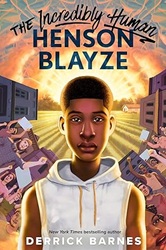 The Incredibly Human Henson Blayze
The Incredibly Human Henson Blayze
by Derrick Barnes
Viking, 2025. 254 pages.
Review written October 7, 2025, from a book sent to me by the publisher.
Starred Review
2025 National Book Award for Young People’s Literature Longlist
The Incredibly Human Henson Blayze is a modern tall tale crossed with a serious discussion of current issues.
The star of the show is Henson Blayze, a thirteen-year-old with incredible gifts. He’s about to play varsity football in his first game as an eighth grader, and the entire small town idolizes him.
But after an amazing and flashy first half of the game, Henson learns that his little buddy, ten-year-old Menkah, is in the hospital, after being beaten bloody by some troopers. Henson leaves the game and doesn’t leave Menkah’s side until he’s better. The town is now as angry with Henson as they adored him before. When Menkah’s better, Henson has to decide if he still even wants to play football.
Henson is larger than life, and this story is larger than life to match. Henson’s ancestors have lived in this Mississippi town for generations, and if Henson is ever harmed, well, let’s just say that they protect him. There’s magical realism in this story so that no harm done to Black folks is permanent. This helps the book be suitable for children, despite the heavy topics, and honestly, it’s nice to see.
Henson’s a sweet kid, not spoiled by all the adoration, and just wanting to help folks out. You’re rooting for him all the way.
I don’t usually like it when authors spell out what they’re trying to do. Can’t the story carry the weight of it? So I kind of wish that Derrick Barnes put his Author’s Note at the back of the book instead of at the beginning. But the fact is, the Author’s Note packs a punch. What he was trying to do is write a version of Maniac Magee where the protagonist is a Black boy. But he also is telling something that doesn’t hurt being spelled out. Here’s a bit from that note:
This is a story about – along with other pertinent themes – America’s strange obsession with the Black body: for labor and for entertainment.
He talks first about slavery, then goes on to say this:
Many thought that African Americans could coexist with white people if we assimilated, and one way of doing that was to provide entertainment. We danced, we made them laugh, we sang, and we performed great athletic feats.
You can still see that today, in American sports. Black athletes are treated like gods by the greater white population. It’s a strange dynamic. On one hand, they see the Black athlete only as an entity – a tool that brings their favorite team a victory. But on the other hand, there is an acceptance of this living character as a hero that’s not like the negative, stereotypic ideal of a Black person that they’ve ben taught – especially if that athlete never speaks on “politics,” a word that has been used to veil issues surrounding race. But as soon as that athlete does something or says something that they deem inappropriate, makes them feel uncomfortable, or removes them from the escapism of simply enjoying their favorite sport . . . things change. Historically, when Black athletes have shown themselves to be more “Black” than “athlete,” there is a disruption of that fantasy where they are not supposed to lean into issues that directly affect them, like racism. Immediately, they have been shunned, ostracized, and blackballed (see Tommie Smith and JOhn Carlos, see Mahmoud Abdul-Rauf, see Colin Kaepernick, see Craig Hodges).
He continues that he’s especially talking to Black children to not sell you soul. And he asks all of us:
You must also become as well-read and educated as you possibly can. Deand respect. Be your most human self, and work on improving yourself every single day. Be kind, and most importantly, be a difference-maker. Be dead set on making this world a better place – not just for yourself or only for people who look like you, speak your language, or worship your religion, but for all of us.
So, yeah, I think Derrick Barnes could have gotten away with not spelling all that out. We love Henson because he’s a kid who is trying to live those very values.
But you know what? It’s a good message, and I’m going to let him make sure no one misses it. And meanwhile, enjoy this wonderful story.
derrickdbarnes.com
Penguin.com/kids
Find this review on Sonderbooks at: www.sonderbooks.com/Childrens_Fiction/incredibly_human_henson_blayze.html
Disclosure: I am an Amazon Affiliate, and will earn a small percentage if you order a book on Amazon after clicking through from my site.
Disclaimer: I am a professional librarian, but the views expressed are solely my own, and in no way represent the official views of my employer or of any committee or group of which I am part.
Subscribe for more reviews and talk about books.
Join the conversation: What did you think of this book?